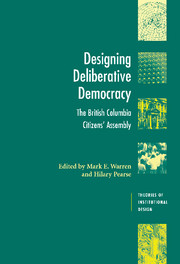Book contents
- Frontmatter
- Contents
- List of Tables
- List of Figures
- Contributors
- Preface
- Introduction: democratic renewal and deliberative democracy
- 1 Who should govern who governs? The role of citizens in reforming the electoral system
- 2 Citizen representatives
- 3 Institutional design and citizen deliberation
- 4 Agenda-setting in deliberative forums: expert influence and citizen autonomy in the British Columbia Citizens' Assembly
- 5 Descriptive representation in the British Columbia Citizens' Assembly
- 6 Do citizens' assemblies make reasoned choices?
- 7 Communicative rationality in the Citizens' Assembly and referendum processes
- 8 Deliberation, information, and trust: the British Columbia Citizens' Assembly as agenda setter
- Conclusion: the Citizens' Assembly model
- References
- Index
6 - Do citizens' assemblies make reasoned choices?
Published online by Cambridge University Press: 22 September 2009
- Frontmatter
- Contents
- List of Tables
- List of Figures
- Contributors
- Preface
- Introduction: democratic renewal and deliberative democracy
- 1 Who should govern who governs? The role of citizens in reforming the electoral system
- 2 Citizen representatives
- 3 Institutional design and citizen deliberation
- 4 Agenda-setting in deliberative forums: expert influence and citizen autonomy in the British Columbia Citizens' Assembly
- 5 Descriptive representation in the British Columbia Citizens' Assembly
- 6 Do citizens' assemblies make reasoned choices?
- 7 Communicative rationality in the Citizens' Assembly and referendum processes
- 8 Deliberation, information, and trust: the British Columbia Citizens' Assembly as agenda setter
- Conclusion: the Citizens' Assembly model
- References
- Index
Summary
Can ordinary citizens make reasoned decisions about complex technical issues normally left to expert opinion? Those who advocate public engagement through the use of citizens' assemblies say Yes. Are such citizens' assemblies able to engage in normative reasoning and come to decisions that reflect the aggregated value preferences of the group? Those who advocate a more deliberative form of decision-making say Yes. Can the mutual learning and discussion that goes on in an open citizens' forum override the advantages typically enjoyed by those with greater political information? Those who advocate the democratizing power of genuine engagement say Yes. The experience of the British Columbia Citizens' Assembly on Electoral Reform allows us to test those assertions.
The Assembly makes a particularly good test of these questions. Electoral systems are complex and esoteric institutions about which most citizens know very little, and the Assembly members ultimately recommended a system few of them had heard of before starting the process. How they came to that decision and on what basis they made their collective choice reveals much about the capacity of citizens to overcome their initial ignorance and to articulate and apply appropriate evaluative criteria in an evolving debate that underlay a deliberative decision-making process. Of course not all these “ordinary” citizens started from the same place: some were more politically interested, informed, and sophisticated than others.
- Type
- Chapter
- Information
- Designing Deliberative DemocracyThe British Columbia Citizens' Assembly, pp. 127 - 144Publisher: Cambridge University PressPrint publication year: 2008
- 15
- Cited by



